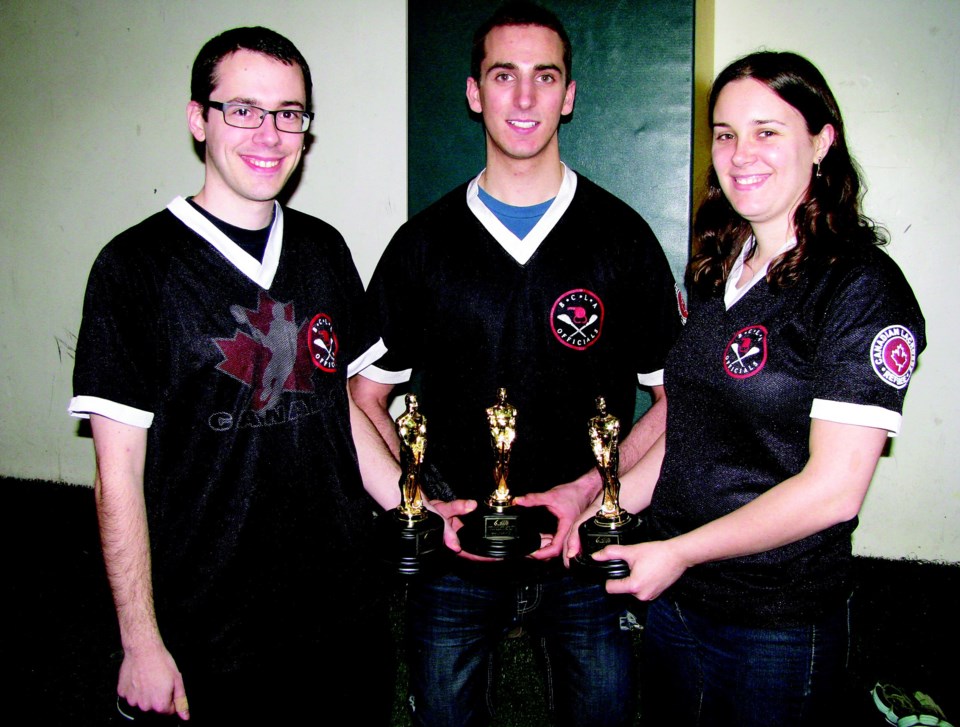Brian Horning credits his youthful physique for allowing him to endure the grind of a lacrosse season.
"It really puts a grind on your body, but being as young as I am I don't have as much of a problem," said the Prince George based senior C lacrosse referee. "Some of the refs are getting a little bit older - we'd definitely like to see a couple more refs out there for a different perspective and a little more variety."
The 21-year-old enters his second season wearing the referee's jersey when the six-team box loop begins another season April 23 as one of only four referees qualified to handled the senior game. Lacrosse is played at the Prince George Coliseum, which presents physical challenges because the hard floor is painful on the knees, while it involves a lot of lateral and stop/go movements.
"It's one of Canada's fastest paced games, so it does require a lot of physical exertion throughout," said Horning.
Last season, Horning earned the Jimmy Gunn Award, a provincial honour handed out to the top referee at the minor or senior level. Horning won for his work at the minor lacrosse level. He was the fourth Prince George referee to earn the honour. Gordon Foulds picked up the honour for minor lacrosse in 2004, while his father Terry, for senior lacrosse, and sister Heather, for minor lacrosse, received the award in 2009 and 2010, respectively.
Both Horning and Gordon Foulds both played the game and made the leap to refereeing in order to become more involved. Gordon said the reason he believes Prince George is lacking in senior referees is twofold.
"A lot of the minor refs in the last little while have been going down [to the Lower Mainland] to play intermediate or junior, so when they leave town they're not able to come up to the senior level," said Gordon. "Another thing is they go into playing in the senior league so they can't ref it.
"There is a very good base of minor referees here in Prince George," he said, adding minor lacrosse referees usually cap at around 15 to 20. "We're just not getting as many people advancing up into senior because they enjoy playing it too much or they go off the play somewhere else. There are actually some years where we turn people away to make sure people do get enough games to make it worthwhile."
The 25-year-old said being a former player does help the understanding of the game, but as his sister has proved it's not necessary.
"It helps me a bit because I understand the game more and I can anticipate what's going to happen a bit so it's easier to react," said Gordon.
Heather's passion for Canada's national summer sport came after spending a year score keeping games while Gordon was the referee. The next year she decided to join him on the floor. These days she's based in Vancouver where she mostly maintains the peace in the intermediate league.
As for being one of the few female referees to work the senior or intermediate level, Heather said, she's had it fairly easy.
"It's worked out for me," said Gordon's older sister. "I started in Prince George where I knew a lot of the players and people involved already since it's a small lacrosse community so I didn't have too much of a problem. I was going to provincials about 10 years ago when I was still up here. By the time I moved down south I already knew all the referees and a lot of the players."
Heather is back in Prince George this weekend to help her father and brother hold referee clinics in Quesnel and Williams Lake. In a perfect world they'll find two new referees willing to, and ready, to take on the 2012 senior C lacrosse season.
For anyone who'd like to give being a referee a try Gordon has a few words of advice.
"Only having two people on the floor at a time means you have to be sure you're watching your specific area a lot more and worrying less about what's happening in your partner's area to make sure we're not missing too much," he said. "Whereas with hockey you've got three, sometimes four, people on the ice so if you miss something it's likely someone else caught it."



